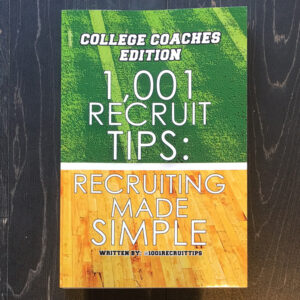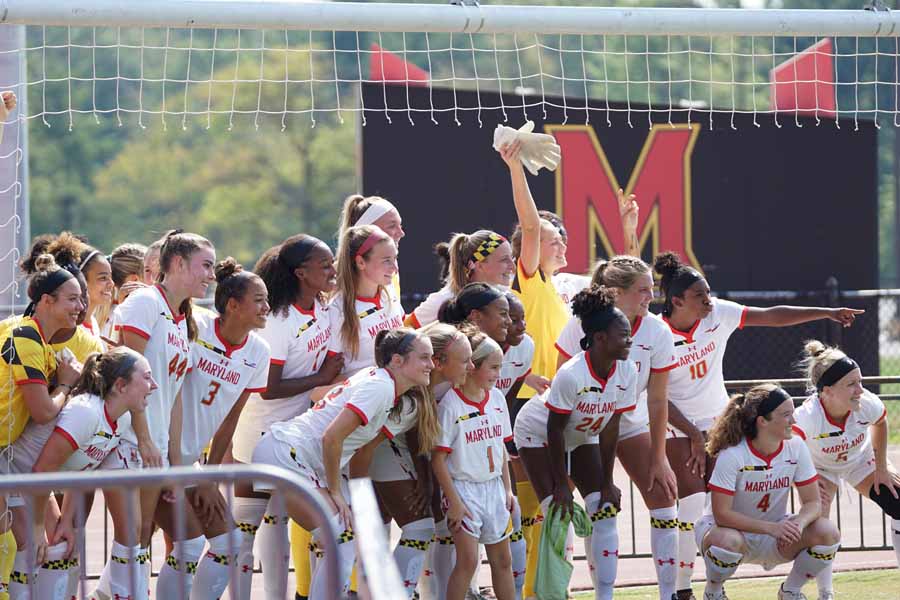Your first few months on a new campus will be a blur—be sure to have a well-thought out plan for your first few days, weeks and months of what is of the utmost importance!
TIPS:
Eliminate the unnecessary from your schedule. A few minutes here and there add up over the day and week. When you take over a program your only priorities are:
o Your Family
o Player Meetings
o Team Chemistry
o Offseason Workouts
o Academic Staff Meetings
o Meeting University Administration, Faculty and Leaders
o Getting to Know Key Prep Coaches in State
o Getting to Know Top Influential Boosters, Alumni and Former Players
o Marketing Program Excitement and Rejuvenation of Fans and Ticket Holders
o Media Meetings
o Recruiting Plan
o Budget Meetings
o Scheduling
• Your players and staff mirror will your energy. Players love playing for coaches who are as energetic as they are, it motivates them. They’ll step up their energy levels and play hard for you. Keep your energy positive.
• Set a goal number of daily calls to make to the following groups: prospects, prep coaches, boosters, former players. Prioritize who the most important contacts are that you need to reach out to immediately and within the first week.
• Don’t diss the old coach, especially personally. Most players and staff have a personal relationship with them, and it’s just not necessary. Simply say, “We’re going to do things differently,” if you feel the urge to take a shot at the former coaching staff. “This is how we’re going to do it now.”
• With your new current players, getting them to focus on attention to detail will be your top priority. Especially if you are walking into a program with a losing or mediocre record, making them get back to attention to detail with fundamentals is critical. Academics. Position drills. Weight room. Being on time. In everything that they do, they need to dot every i and cross every t. Weed out the lazy.
AS MUCH AS THEY MAY RESIST IT AT FIRST, MOST PLAYERS RESPECT COACHES WHO HOLD THEM TO HIGH EXPECTATIONS.
• In the first few hours or weeks, you will learn more about each of your players by what they do, not by what they say. How did they handle the transition between coaches? Did they skip class, skip workouts, gain weight? Were they leaders? Their body language and attitude will tell you more than their words. Get feedback from staff that has remained in place during the transition: academic counselors, strength coaches, operations staff. Who were our leaders? Who disappeared?
• Teach YOUR way, the best coaches are the ones who are confident enough in their own skin. Repetition, repetition, repetition of your key points, your plan, your mission statement. What is your identity offensive, defensively? What mentality do you want the team to take on? It will take 18-24 months to get things running the way you want them to. Teach, repeat. Teach, repeat.
• If you are taking over a program with a losing or mediocre record, it’s okay if you run a few players off. Usually players with bad attitudes and weak work ethics quit or threaten to transfer—let them! These are usually the players who were dead weight, poor leaders and part of the reason that the team was losing in the first place!
• Follow through with what you say you will do, especially with discipline and accountability. Players can see right through coaches when they know they won’t be held accountable for their actions and they will quickly lose respect for you. As much as they may resist it at first, most players respect coaches who hold them to high expectations. Don’t let your key players get away with a different set of rules, it will come back to bite you.
COACHES: Read more from ‘Recruiting Made Simple’
• Cut off talk from players about former injustices, favoritism, hardships. When they start in on why they never got a fair shot to showcase their skills, simply tell them that jobs are “wide open” right now!
• Communication is key—be CRYSTAL CLEAR about your rules, expectations and how you want things done. Minimize your goals down to a few points and emphasize, emphasize, emphasize! Be very simple and clear from Day 1.
• Have position coaches meet individually with each player and evaluate their video—immediately! Get a scouting report from your staff and take the time to sit down and meet with each player individually. Be direct and honest with them, look them in the eye. Reiterate your expectations, plan and goals to each one individually. Give them a sheet with rules and expectations in writing—post copies everywhere around the facility!
• Your most important recruits… are already on campus! Understand who you have, and determine what you need! Immediately determine which positions lack depth.
YOU CAN’T ALLOW YOUR VALUABLE MINUTES (YES, MINUTES!) TO BE WASTED ON NON-URGENT ISSUES, LET ALONE HOURS OR DAYS!
• Always assign responsibilities for coaches who are not out on the road recruiting. Use the time of your staff wisely. If they aren’t recruiting, they need to be building player relationships, campus relationships, calling high school coaches, evaluating video, organizing camps, etc. Give everyone specific areas to jump in and manage as you hit the road recruiting.
• Be a strong teacher of the game. Your new players are sizing you up, do you know your stuff? How can you help them win and develop?
#CoachTips: Read more articles for coaches
• Set up short and long term goals for your team. Communicate these goals and post them so that everyone can see them. 6-week segments, monthly or weekly segments. Start with small goals to get the program back on track.
• Win the campus: develop a list of key university leaders, faculty, Athletic Department staff and student groups that you need to meet with early. Set up a few key meetings to get to know the most important groups or individuals. Write them a hand-written note after the meeting, thanking them for the time and stressing the important role they will play in your program. Be energetic, share your passion about the program enthusiastically!
READ MORE: 180 Ways to Market Your Program
• Don’t diss the old coach to the media, it’s not necessary. Instead, promote YOUR plan and staff! Again, it’s a waste of time and there is no value in it. Focus on the future not the past, change the storyline.
• Call the parents of your current players to introduce yourself and give them your direct contact information. Get their direct cell phone numbers and emails. Most issues between parents and coaches stem from a lack of communication. Communicate with parents regularly and be sure that they know how to get in touch with you.
• Don’t entertain conversations about playing time with parents. Cut them off, tell them that jobs are open and everyone is getting a fair shot. The rest of what they have to say in relation to playing time is a waste of your time. Be direct and honest with them about what you are looking for from your players.
• Give key boosters your direct cell number and email- respond to them all. Don’t delegate to your assistants or give them generic contact information.
• Hit the ground running with high school coaches. Make a set number of daily calls to high school coaches to introduce yourself. Invite them to practice or clinics. Make sure they feel welcome around your program.
• Develop your Top 25 recruits that you need to be communicating with regularly. Each assistant/position coach needs 25+ players they need to be contacting frequently as well, on top of their broader mailing list of potential prospects.
• Identify your leaders. Whose messages are being heard in the lockerroom, who are a majority of the players following? Are they setting great examples? Do they want to win? Are they making the sacrifices necessary to win? Are they good people? Get them in your office regularly, eat with them in the dining hall, watch film with them.
• Develop key selling points for recruiting. What are the top 3-5 things that make you different, appealing and successful? What are the main reasons that you have drawn your top players to your program? What are your advantages? Use these points in your phone calls, emails, mailouts, social media for recruiting. (See page xxxx).
• Realize you must make improvements every day – player relations, academics, strength and conditioning, position skills, fundraising, team attitude. Attack the program’s weaknesses and strive to have a “win” everyday in the areas that can help you win games. Focus on the core issues and the fundamentals of success.
• What changes to your style of play will you have to make in order for the first season to be successful with the players who are already within the program? Evaluate your personnel. Work with what you have and put your fingerprints on the program over the next 12-18 months. How can you win in the short term while building for the future?
• Keep a daily list of the core areas that need your attention. Laminate it, carry it with you always, put it in your phone, post it around your office and facility. Set alarms in your phone! Follow up with each area daily, assign staff to focus on key areas that need improvement and devote time, energy and resources to fixing the weak points.
• Touch base with recruits who have committed to the former staff. Have you decided to honor their scholarship offer or does your style of play not match up? These prospects will likely speak to the media quickly and it’s best to be direct and honest with them on where you are at with evaluations and what is mutually best for you both. Communicate with them directly, don’t just avoid them.
• Even if you are a former player or former coach of that school, you still must get to know the campus, Athletic Department, faculty and staff. Places don’t change but the people do, get out and meet the new key people you will be working with.
• Hire a staff that is diverse in strengths, backgrounds, ages. Do not hire a staff that is filled with people just like you. Make a list of strengths your team will need to be successful and put the puzzle together with the coaches and assistants that you bring in.
• Get off on the right foot with the local media. Set up individual meetings with the key beat writers. Be personable. They have a job to do – give them interesting storylines to write about. Help them do their job by providing positive stories, antidotes, humor. Go beyond answering every question with a ‘yes’ or ‘no,’ don’t give generic responses. Let reporters see your human side. Nothing is ever off the record, so don’t say anything that you wouldn’t want to read publically!
• Be visible on campus – at the dining hall, at games supporting other university teams, at major student activities, Greek events. You are recruiting students and faculty to attend games and to support your team—get out and shake hands and take selfies! Put weekly effort into this!
• Be yourself.
• In terms of discipline with your players, it’s always easier to be tough in the beginning and ease up than to be laid-back and forced to toughen up months later. Set high expectations from Day 1.
• Take time to hire your staff. You are building for the long-term. It’s better to hire the right people than just get bodies into the meeting room. Same with recruiting. It’s better to get it right than to just get it done fast. Be selective of the people you invite into your program!
• Set dates for a coaching clinic and team camp, communicate these dates with prep coaches in the state and region immediately. Show that building relationships with prep coaches is a top priority to you.
• Get to know your new players personally. Eat meals with them in the dining hall, talk to them about life outside of sports, find out about the important people in their lives and their goals outside of sports. Players will play hard for you when they know you care about them as people. You have to invest that time to get to know them other than their film and stats.
• Get involved in KEY community speaking engagements, you won’t be able to say yes to everyone. Your time needs to be limited but any local organization that you can speak to or meet with that helps you sell tickets, energize your fanbase is worth your time. Find out who in the community is the heartbeat of your program – donors, supporters, sponsors, season ticket holders. Energize them and help them draw in more fans!
READ MORE: Tips for College Coaches





